Illusions of Competence
1 Chunking
What is a chunk?
When you first look at a brand new concept it sometimes doesn't make much sense, as shown by the jumbled puzzle pieces here. Chunking is the mental leap that helps you unite bits of information together through meaning. The new logical whole makes the chunk easier to remember, and also makes it easier to fit the chunk into the larger picture of what you're learning. Just memorizing a fact without understanding or context doesn't help you understand what's really going on or how the concept fits together with other concepts you're learning. Notice there are no interlocking puzzle edges on the puzzle piece to help you fit it to other pieces.
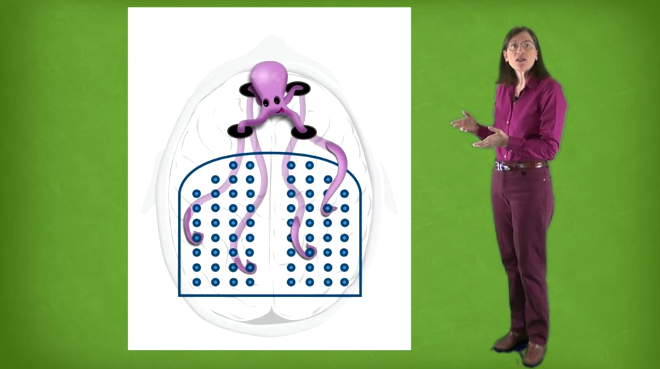
Four slots of working memory appear to hang out in the part of your brain right behind your forehead known as the prefrontal cortex. When you're focusing your attention on something it's almost as if you have an octopus. The octopus of attention that slips its tentacles through those four slots of working memory when necessary to help you make connections to information that you might have in various parts of your brain.
Remember, this is different from the random connections of the diffuse mode. Focusing your attention to connect parts of the brain to tie together ideas is an important part of the focused mode of learning. It is also often what helps get you started in creating a chunk. Interestingly when you're stressed your attentional octopus begins to lose the ability to make some of those connections. This is why your brain doesn't seem to work right when you're angry, stressed, or afraid.
If you had the television going on in the background or you;re looking up every few minutes to check or answer your phone or computer messages, it means you're going to have more difficulty in making a chunk, because your brain is not really focusing on chunking the new material. When you first begin to learn something, you're making new neural patterns and connecting them with preexisting patterns that are spread through many areas of the brain. Your octupus tentacles can't reach very well if some of them are off on other thoughts using up some of the limited slots in your working memory.
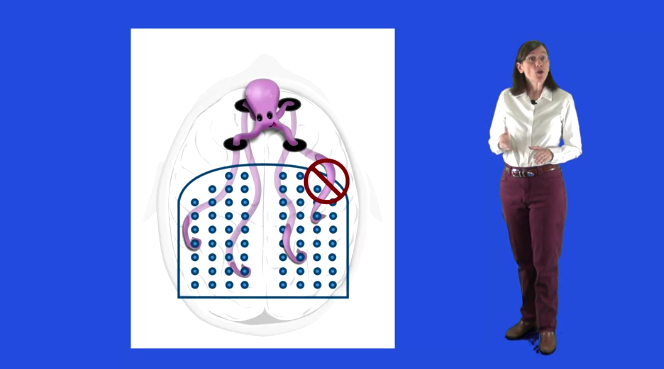
Allow the focused and diffused modes of thinking to take turns in helping them figure out what's going on.
Can you create a chunk if you don't understand? Yes, but it's often a useless chunk that won't fit in with or relate to other material you're learning. That said, it's important to realize that just understanding how a problem was solved for example, does not necessarily create a chunk that you can easily call to mind later. Don't confuse the aha! of a breakthrough and understanding with solid expertise. That's part of what you can grasp an idea when a teacher presented in class, but if you don't review it fairly soon after you first learned it, it can seem incomprehensible when it comes time to prepare for a test.
In math and science related subjects, closing the book and testing yourself on whether you yourself can solve the problem you think you understand will speed up your learning at this stage. You often realize the first time you actually understand something is when you can actually do it yourself.
Just because you see it or even that you understand it,
it doesn't mean that you can actually do it.
Only doing it yourself helps create the neural patterns that underlie true mastery.
Okay, don't think there can appear something more important during my next 2 pomodoros than something above this paragraph.
Doing a rapid two-minute picture walk through a chapter in a book before you begin studying it, glancing at pictures and section headings can allow you to gain a sense of the big picture, so can listening to a very well-organized lecture. These kinds of activities can help you know where to put the chunks you're constructing, how the chunks relate to one another; just as you see here with the image of the man in the car. Learn the major concepts or points first, once you have doen this, fill in the details. Even if a few of the puzzle pieces are missing at the end of your studies, you can still see the big picture.
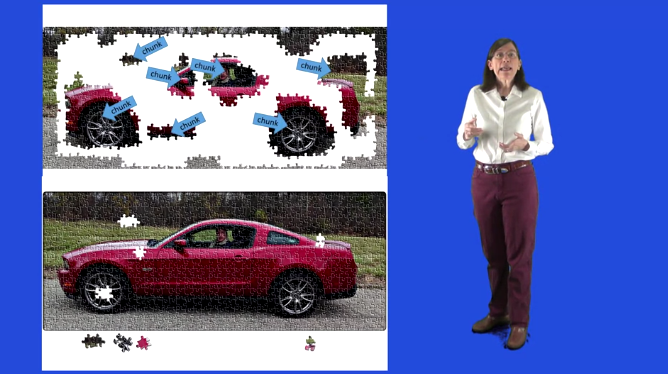
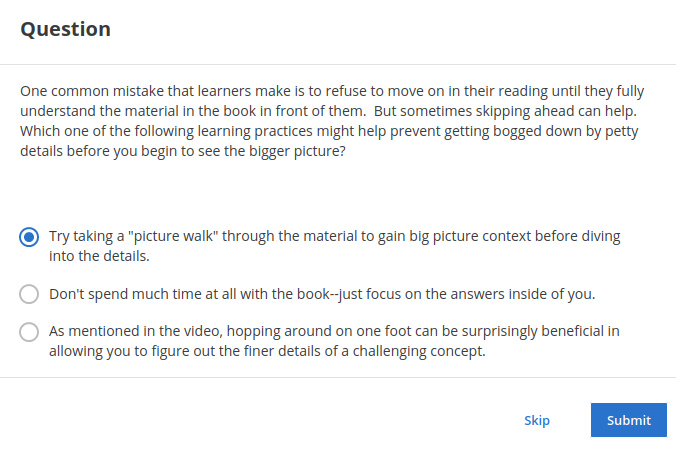
2 Illusions of Competence
One of the most common approaches for trying to learn material from a book or from notes is simply to reread it. But psychologist, Jeffrey Karpicke, has shown that this approach is actually much less productive than another, very simple, technique. Recall. After you've read the material, simply look away, and see what you can recall from the material you've just read.The retrieval process itself enhances deep learning
and helps us to begin forming chunks. It's almost as if the recall process helps build in little neural hooks, that we can hang our thinking.
One way to think about this type of learning and recall, is shown right here. As we mentioned earlier, there are four or so slots, in working memory. When you're first learning how to understand a concept, or technique to solve a problem, your entire working memory is involved in the process. As shown by this sort of, mad tangle of connections between the four slots of working memory.

As you begin to chunk the concept, you will feel it connecting more easily and smoothly in your mind.

Once the concept is chunked, it takes up only one slot in working memory. It simultaneously becomes one smooth strand that's easy to follow, and to use to make new connections. The rest of your working memory is left clear. That dangling strand of chunked material has, in some sense, increased the amount of information available to your working memory. It's as if the slot in working memory is a hyperlink that's been connected to a great big web page.
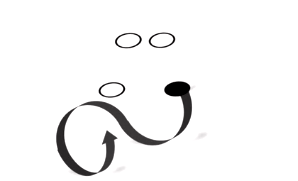
Now, you understand, why it is key that you are the one doing the problem solving or mastering the concept. Not whoever wrote the solution manual, or book, on whatever subject you're studying. If you just look at the solution, for example, then tell yourself. Oh yeah, I see why they did that. Then the solution is not really yours. You've done almost nothing to knit those concepts into your own underlying neural circuitry. Merely glancing at a solution and thinking you truly know it yourself is one of the most common illusions of competence in learning.
Okay this is exactly what every data science youtuber is saying. do the project, don't spend too much time on learning concepts and etc. "I have learned way more from doing than from actually learning". keep that in mind.
2.1 Labai gold info below
The reason students like to keep rereading their notes or a textbook, is that when they have the book or Google open right in front of them, it provides the illusion that the material is also in their brains. But it's not, because it can be easier to look at the book instead of recalling, students persist in their illusions studying in a way that just isn't very effective. This is a reminder that just wanting to learn the material, and spending a lot of time with it, doesn't guarantee you'll actually learn it. A super helpful way to make sure you're learning and not fooling yourself with illusions of competence, is to test yourself on whatever you're learning. In some sense, that's what recall is actually doing. Allowing you to see whether or not you really grasp an idea. If you make a mistake in what you are doing, it's actually a very good thing. You want to try not to repeat your mistakes, of course, but mistakes are very valuable to make in your little self tests before high stakes real tests. Because they allow you to make repairs and you're thinking flaws bit by bit mistakes help correct your thinking, so that you can learn better and do better.
But here's another tip, recalling material when you are outside your usual place of study can also help you strengthen your grasp of the material. You don't realize it, but when you are learning something new you can often take in subliminal cues for the room and the space around you at the time you were originally learning the material. This can throw you off when you take tests because you often take tests in a room that's different from the room you were learning in. By recalling and thinking about the material when you are in various physical environment, you become independent of the cues from any one given location.
Alright my third pomodoro is over, going to take a little break now and then review, try to recall the material.
"I have cancelled several commitments since this course has started so that I could stay home and take notes on video lectures and do my Pomodoros (on my to do list I write down the number of Pomodoros I am going to apply on each topic instead of a length of minutes or hours, I just like writing '2 pomodoros' ;) And I feel fantastic! Really, there is nothing that has helped my mood, sleep, eating, anxiety, feelings of guilt/shame etc than making small 'process oriented' to do lists for myself and accomplishing them without focus on the actual product. After doing two Pomodoros with a break in-between I feel like I can just keep going, bring it on, bring on more (okay, well it took a few days to get to that level of excitement, but I got there)."